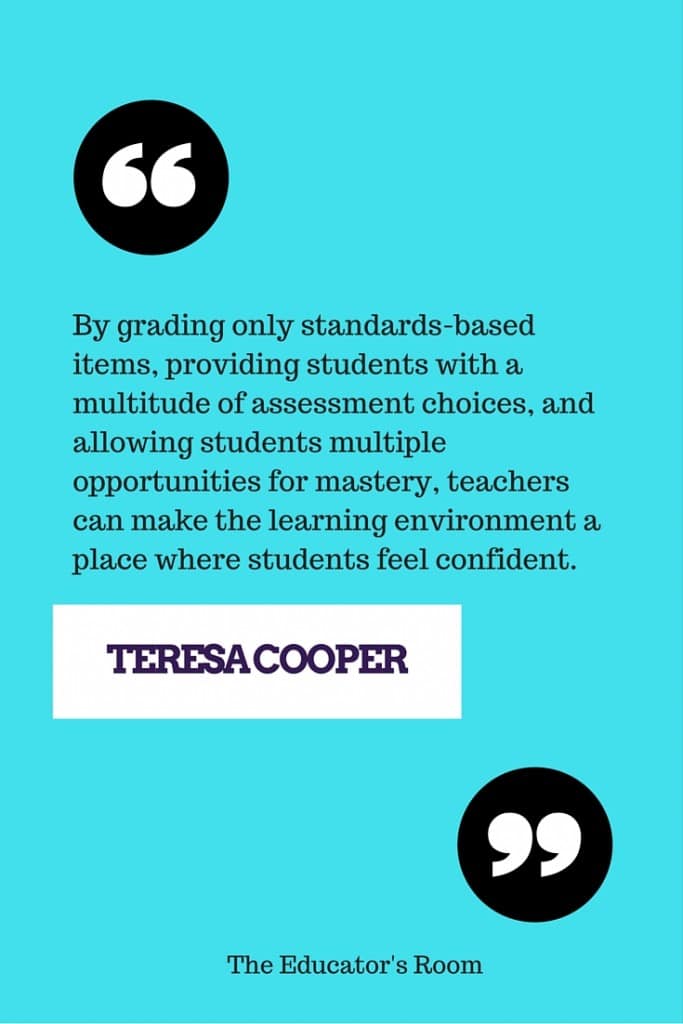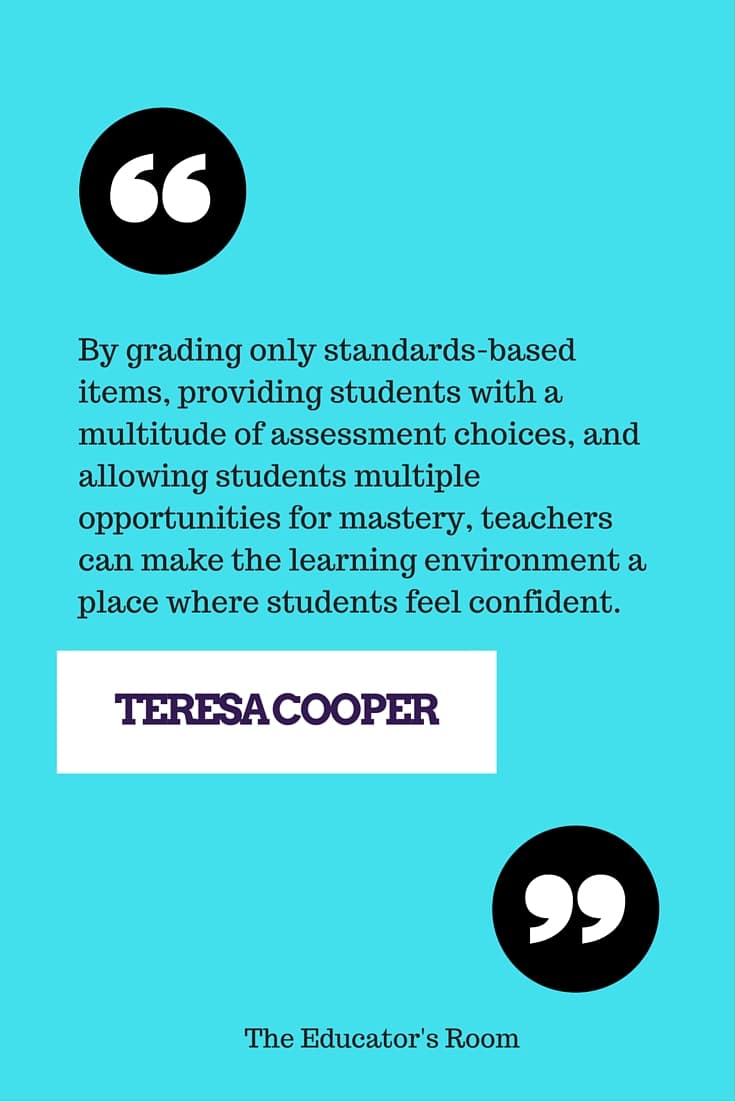What should teachers include in their grade book? Coming from several school cultures where there is a category for everything and almost everything is graded, I notice a recurring theme. Students who typically do well continue to do so, but the students who struggle rarely find success. The fact that homework, classwork, quizzes, and tests are all graded does not seem to encourage those who lack motivation. While the common thought process is that grading holds students accountable, the fact is that we can still hold students accountable without grading unnecessarily.
Grading what matters–proof of student achievement–should be the main focus. When it comes to the subject of students and grading, I hold the following truths to be self-evident: practice work should not count, tests are not the only form of assessments, and students ought to be allowed the chance to demonstrate mastery when they are ready (Fisher, Frey, & Pumpian, 2011).
Practice Work is Just That…Practice! Many teachers, myself included, have fallen into the trap of grading homework, but grading homework is a practice in futility for encouraging the discouraged student. Reeves (2007) describes learning as a process with two phases: a phase where students practice and a phase where students demonstrate their abilities with their performance. Looking for further evidence that grading practice work doesn’t matter? In one school, a teacher who only counted standards-based questions and exams as a basis for grades and rejected the practice of grading homework managed to raise 15 of his students’ biology test scores (Cox, 2011).
We should practice the art of grading what matters. The traditional approach of grading nearly everything, including homework, is based on a misconception that students need a lot of grades in the grade book as evidence of learning rather. In truth, evidence of learning only requires tandards-based assessments (Laureate Education, 2013a). This misconception is one that would be great to change for the students at my school, and Fisher, Frey, and Pumpian (2011) echo this sentiment, stating that grades should be reserved for demonstration of proficiency and mastery of the standards. So, although many teachers still grade practice instead of using it as a true formative assessment to inform learning, in reality only evidence of standards proficiency matters.
Tests are NOT the Only Form of Assessment In a country where multiple-choice exams are the barometer of school success, it is difficult not to argue that tests are the best way to assess student learning. But, Fisher, Frey, and Pumpian (2011) argue, assessing student learning may also include assessments through projects, oral presentations, writing, and performances. Further, involving students in the process of assessment is extremely important. As stated by Ken O’Connor (Laureate Education, 2013b), teachers involve students in the assessment process several ways, including allowing them to suggest appropriate assessments, co-construction of rubrics, self-assessment, and student-involved conferences (Laureate Education, 2013b).
While I already involve students in self-assessment and conferences, letting them in on suggesting types of assessments and constructing rubrics is something that I also need to attempt in order to help promote their success. Allowing students to become part of the assessment process translates to higher achievement in students because they begin to understand our expectations and what standards they are attempting to demonstrate mastery of when they become more involved (Reeves, 2007). Performance-based assessments are excellent sources of information if rubrics are well-constructed and based on the standards. Using these assessments not only helps teachers begin grading what matters, but makes the grades matter more to the students. They give students an opportunity to use the information they’ve been taught in meaningful ways that deepen their learning experiences in a way that multiple-choice tests can never match.
Should Teachers Allow Re-takes on Assessments? So, after making decisions about what grading matters most and on types of assessments, the biggest question to consider is whether or not students should get a second chance after failing an assessment. According to O’Connor (Reeves, 2007), teachers should emphasize a student’s most recent demonstration of mastery since learning is a continuous process. You may argue that retakes make assessments unfair for those who try to do well the first time, but the reality is that students learn at different paces and in most cases want success just as much as their peers. However, one option that will discourage students who make no efforts is to require students to offer proof that they have made attempts to increase their chances of achievement before retaking any assessment. This sentiment is echoed by Fisher, Frey, and Pumpian (2011), who added that teachers who adopted course competencies increased accountability for practice work–students who wanted to retake an assessment needed to finish all of their practice work first, which also increased student achievement.
Rather than holding on to the mindset that students should be required to pass an assessment at the first attempt, teachers should make students more responsible for learning by providing them with opportunities demonstrate mastery on assessments once they complete the work assigned to them, even if they fail the first time. Success comes with time, effort, and, sometimes, reteaching. Students who know they can be successful in class are more likely to make achievement gains because they are less likely to give up. In essence, the principle is that all students can learn, but some need more time than others to do it.
Grading What Matters: In summary, assessment of student achievement can be tricky, but a good way to start is by utilizing performance-based assessments and grading what matters. By grading only standards-based items, providing students with a multitude of assessment choices, and allowing students multiple opportunities for mastery, teachers can make the learning environment a place where students feel confident. In other words, making learning relevant translates to making the classroom a place where success happens.

References: Cox, K. (2011). Putting classroom grading on the table: A reform in progress. American Secondary Education, 40(1), 67-87. Fisher, D., Frey, N., & Pumpian, I. (2011).
No penalties for practice. Educational Leadership, 69(3), 46-51. Laureate Education (Producer). (2013a). Misconceptions and obstacles to productive assessment [fusion_builder_container hundred_percent=”yes” overflow=”visible”][fusion_builder_row][fusion_builder_column type=”1_1″ background_position=”left top” background_color=”” border_size=”” border_color=”” border_style=”solid” spacing=”yes” background_image=”” background_repeat=”no-repeat” padding=”” margin_top=”0px” margin_bottom=”0px” class=”” id=”” animation_type=”” animation_speed=”0.3″ animation_direction=”left” hide_on_mobile=”no” center_content=”no” min_height=”none”][Video file].
Based on the work of Jay McTighe, 2009. HOPE Foundation, Bloomington, IN. Retrieved from https://class.waldenu.edu
Laureate Education (Producer). (2013b). Student involvement, communication, and goal setting [Video file]. Based on the work of Jay McTighe, 2009. HOPE Foundation, Bloomington, IN. Retrieved from https://class.waldenu.edu Reeves, D. B. (ed.). (2007). Ahead of the curve: The power of assessment to transform teaching and learning. Bloomington, IN: Solution Tree Press.[/fusion_builder_column][/fusion_builder_row][/fusion_builder_container]




